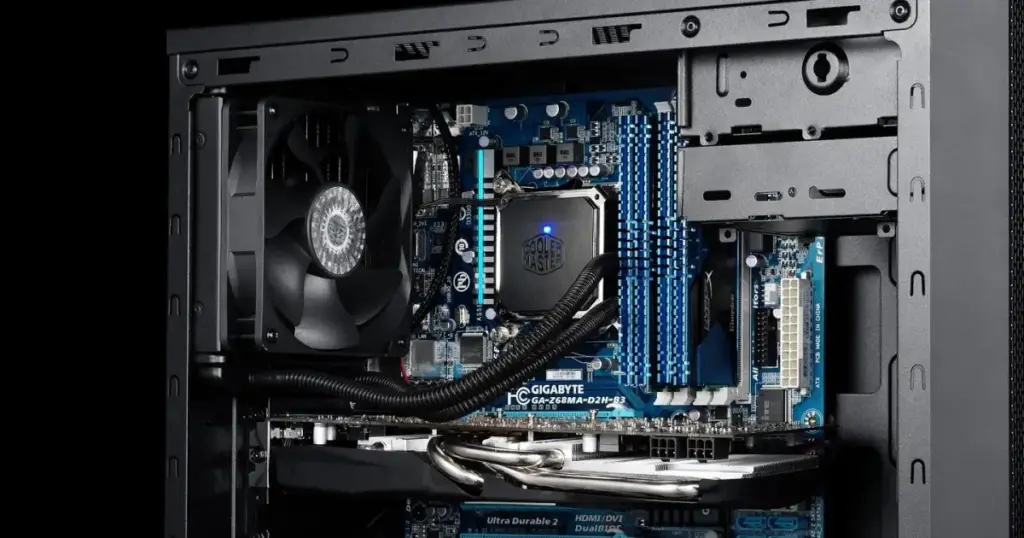How Does A CPU Cooling Fan Work?
A CPU cooling fan is an essential component of any computer system. Its primary purpose is to keep the processor cool, which helps to ensure stable operation and prevent damage due to overheating. The fan draws cool air into the system and expels hot air. As the fan spins, it creates a flow of air that helps to dissipate heat from the processor and other components.
The CPU cooling fan is essential in ensuring the health and durability of your computer in this way. In this article, we will explorewhat is a cooling fan, how do fans work along with the type of fans and much more. Well, if you loves to explore about cooling fans then we would strongly recommend you to read our latest blog featuring the best coolers for ryzen 5 5600x.
Imagine your body as a computer processor that works tirelessly to perform various tasks. Just like your body generates heat while working, a processor generates heat while processing data. This heat, if not dissipated, can damage the processor and affect its performance. That’s where the CPU cooling fan comes in. Just like how you sweat to cool down, the fan draws cool air into the system and expels hot air out, helping to dissipate the heat generated by the processor. This ensures that the processor can continue to work efficiently without overheating and causing damage.
Types Of CPU Cooling Fans

There are several types of CPU cooling fans available, including
1. Air-Cooled CPU Fans
These fans use a combination of a heat sink and a fan to dissipate heat from the CPU.
2. Liquid-Cooled CPU Fans
These fans use a liquid coolant to absorb heat from the CPU, which is then circulated to a radiator, where a fan cools it before returning it to the CPU.
3. Passive CPU Coolers
These coolers don’t have a fan and rely on natural convection to dissipate heat from the CPU.
4. Hybrid CPU Coolers
These coolers use a combination of air-cooling and liquid Cooling to provide optimal cooling performance.
5. Pettier Coolers
These coolers use a thermoelectric Cooling device to cool the CPU by absorbing and transferring it to a heat sink.
6. Phase-Change CPU Coolers
These coolers use a refrigeration system to cool the CPU by changing the state of a refrigerant from liquid to gas and back again.
How does Air cooled cpu work?
Air-cooled CPU fans combine a heat sink and a fan to dissipate heat from the CPU. The heat sink, a metal component with fins, absorbs heat from the CPU and spreads it across a larger surface area. The fan then draws cool air over the heat sink and expels hot air out, helping to regulate the temperature of the CPU. This process continues as long as the computer is running.
The main components of an air-cooled CPU fan include a heat sink, a fan, and a thermal paste. The heat sink is a metal component with fins that are placed directly on top of the CPU. The fan is typically mounted on the heat sink and draws cool air over the fins to dissipate heat. A thin layer of thermal paste is placed between the CPU and the heat-sink to enhance heat transfer. Together, these components regulate the CPU’s temperature and prevent it from overheating.
Advantages And Disadvantages Of Air-Cooled CPU Fans
Air-cooled CPU fans have several advantages and disadvantages.
Advantages
1. Affordable
Air-cooled CPU fans are generally cheaper than liquid-cooled options.
2. Low Maintenance
Air-cooled CPU fans are easy to install and require little maintenance compared to liquid-cooled options.
3. Quiet Operation
Most air-cooled CPU fans operate quietly, which makes them a popular choice for users who value noise reduction.
Disadvantages
1. Limited Cooling Performance
Liquid-cooled CPU fans may be less effective than liquid-cooled options at dissipating heat, which can limit the performance of high-end CPUs.
2. Space Constraints
Air-cooled CPU fans may take up more space in a computer case than liquid-cooled options, which can be a problem for users with limited space.
3. Limited Overclocking Capability
Overclocking, which is the process of increasing the speed of the CPU beyond its original specifications, may not be possible with air-cooled CPU fans, as they may not be able to dissipate the additional heat generated by the overclocked CPU.
Overall, air-cooled CPU fans are famous for most users due to their affordability, ease of installation, and quiet operation.
Read more: Best cpu cooler for ryzen 5 3600
How does liquid CPU cooler work?

Liquid-cooled CPU fans are a type of advanced Cooling system used in high-performance computers. They are designed to dissipate heat from the processor using a liquid coolant that absorbs the heat and is then transported through a system of components, including a water block, pump, radiator, and tubes.
The water block is the component that sits directly on top of the processor and is dependable for absorbing the heat generated by the CPU. The pump circulates the coolant through the system while the tubes transport the coolant to and from the water block and radiator.
The radiator is the component responsible for dissipating heat from the coolant. A heat exchanger uses a fan to draw air across its fins, cooling the coolant that has passed through the system. The cooled coolant is then recirculated back to the water block, where the cooling process starts again.
Liquid-cooled systems dissipate heat more efficiently than traditional air-cooled CPU fans. They are quieter, more effective, and can handle higher heat levels. Liquid-cooled CPU fans are commonly used in high-performance gaming computers, workstations, and servers, where efficient Cooling is crucial to maintain stable and reliable performance.
Advantages And Disadvantages Of Liquid-Cooled CPU Fans

Liquid-cooled CPU fans, also known as liquid Cooling systems or water cooling systems, are a popular alternative to traditional air-cooled CPU fans. Here are some advantages and disadvantages of liquid-cooled CPU fans:
Advantages
1. Better Cooling Performance
Liquid-cooled CPU fans can remove heat from the CPU more efficiently than air-cooled fans. This means that they can keep the CPU running at lower temperatures, which can help improve its performance and lifespan.
2. Quiet Operation
Liquid-cooled CPU fans typically operate at a lower noise level than air-cooled fans. This is because they donot rely on fans spinning at high speeds to dissipate heat, which can create a lot of noise.
3. Overclocking Capability
Liquid cooling systems are better suited for overclocking, increasing the CPU’s clock speed beyond its default settings. Overclocking generates more heat, and liquid Cooling can help dissipate this heat more effectively.
Disadvantages
1. More Expensive
Liquid-cooled CPU fans are generally more expensive than air-cooled fans. They require additional components such as a radiator, pump, and tubing, which can increase the overall cost.
2. More Complex
Liquid cooling systems are more complex than air-cooled fans, requiring more installation time and effort. Poor installation may result in leaks or other problems.
3. Maintenance
Liquid cooling systems require more maintenance than air-cooled fans. The coolant needs to be changed periodically, and the system needs to be checked for leaks and other issues regularly.
Liquid-cooled CPU fans offer better cooling performance and quieter operation and are better suited for overclocking.
Maintenance Of Cpu Cooling Fan

Maintaining a CPU cooling fan is crucial to ensure that your computer’s CPU operates at an optimal temperature. However, if your cpu gets hot, then it is strongly advised to give it a cooling effect and for that we would request you to read our guide on how to connect extra fans to motherboard.
Moreover, to do this, you should regularly clean the fan blades and remove any dust or debris that may have accumulated on them. You can use compressed air or a soft-bristled brush to clean the blades. You should also check the fan’s motor and lubricate it if necessary. It’s also essential to monitor the fan’s speed and temperature using software tools or the BIOS settings to ensure it operates within the recommended range.
Despite proper maintenance, there are a few common problems that you may encounter with a CPU cooling fan. Here are some troubleshooting tips for three common issues
1. Fan Noise
If your CPU cooling fan is making an unusual noise, it’s usually due to the fan blades being dirty or worn out. Clean the edges, and if the noise persists, replace the fan. If the noise is clicking or rattling, it could indicate that the fan is hitting something or is out of balance.
2. Overheating
If your CPU is overheating, it could be due to a weakness with the CPU cooling fan. Check that the fan is spinning and operating at the correct speed. If the fan works correctly, you may need to reapply thermal paste to the CPU or check that the CPU heat sink is perfectly mounted.
3. Malfunctioning Pump
A malfunctioning pump can cause a liquid-cooled CPU cooling system to fail. If you notice the liquid in the system is not circulating, check that the pump is operating correctly. You can do this by listening to the pump’s noise or by checking the flow rate of the liquid. If the pump is not working, you may need to replace it or seek professional assistance.
Conclusion
CPU cooling fans are crucial for maintaining optimal performance and longevity of computer systems. However, there are many problems the user may face such as cpu usage issues. Thus, if you are also one of those, check out your guide on how to fix cpu usage when playing. Moreover, there are type of fans- such as Air-cooled CPU fans, which is typically made up of a heat sink, fan, and thermal paste, work by dissipating heat generated by the CPU to prevent overheating.
Overheating can cause damage to computer components, reduce system performance, and shorten the computer’s lifespan. A properly functioning CPU cooler, or processor cooling fan, is essential for keeping the CPU at an optimal temperature, which ensures smooth operation and prevents damage. Therefore, investing in a high-quality CPU cooler, or pc cooling fan, is critical for maintaining the health of your computer system and prolonging its lifespan.



